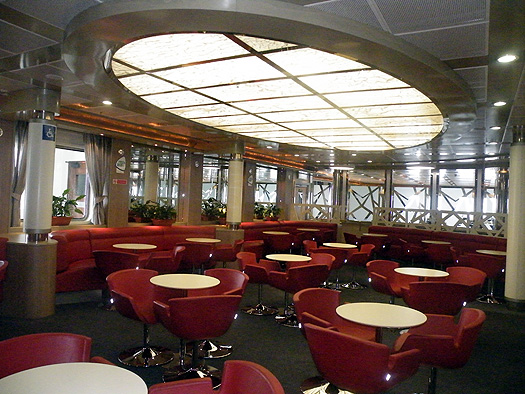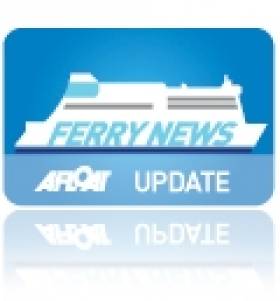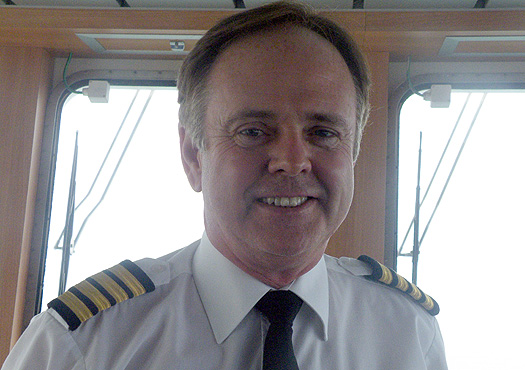Displaying items by tag: Captain ferry interview
Ferry Captain Interview: Irish Ferries Ro-Pax Epsilon on the Dublin-Wales Route and France Service
#FerryCaptainInterview – Captain Paul Sellers, master of Irish Ferries chartered ro-pax ferry Epsilon, talks about his seafaring career to Jehan Ashmore, and the vessel which serves the core Dublin-Holyhead route in addition the new direct link to France, between the Irish capital and Cherbourg.
Passengers on the 26,375 tonnes Epsilon have economy style service facilities that include a bar, cafeteria, self-service restaurant, two and four berth cabins and free wi-fi service. In addition the ro-pax has boosted vehicle deck space capacity with approximately 2,860 lane metres.
The 19 hour French route augments the cruiseferry operations of the Oscar Wilde on the Rosslare-Cherbourg route and the seasonal-only service to Roscoff.
Where did you study for your seamanship qualifications and what was the most challenging aspect involved?
I studied at Hull Nautical College for both Pre-Sea and the Second Mates and then with the demise of this fine institution I continued with my Chief Mates and Masters Certificates at South Tyneside College South Shields.
Sections of algebra, particularly differentiation I found at times quite challenging, but fortunately my girlfriend and later my wife Julie was a maths graduate and could help me out with that. Also Meteorology could be an enigma, however one day the penny drop and it all became clear ...'hot air rises'
How long was your deep-sea career and where in the world did this take you?
My deep sea career lasted 18 years and took me to all parts of the world with the exception of main land China and East Africa, the rest of the world was pretty much covered during that period.
Describe your thoughts on having your first command, the name of ship and company?
I was fortunate to be promoted to Master in a ship I was serving as Chief Officer in so I was comfortable with the vessel and those I worked with. The ship was an English Channel ro-pax vessel operated by Norfolk line in the Dover Straits between Dover and Dunkirk, this being the mv Northern Merchant.
She was a fine ship to command being predictable and very manoeuvrable, but still a sharp learning curve when you first start. It was a little strange at first I remember walking down the alleyway and someone called 'Captain' I continued to walk they called again, then I realised they meant me ...I was now the Captain!
Also the second mate asked me to look at something one day which was not working, I asked him what he usually did when this happened before, he said I send for the Captain ...and I thought right I am now expected to know all the answers now.
Captain Paul Sellers
Why did you move from a career working in deep-sea to a short-sea role?
The long trips of between 4/6 months then were not compatible with a good family life , I had luckily secured a position which was 2 months on and off but there was no realistic chance of early promotion so I thought I would try and secure some relief work on Ferries during my leave.
I was offered some work with Stena which lead to further work which I enjoyed and they seemed to like me as the offered me a full time position and I left deep sea for the cut and thrust of the Ferry world.
Can you outline your career path and how this led to your current role as master of Epsilon.
A varied career on different vessel types serving with Blue Star for 14 years from cadet to Chief Officer then 2 years as Chief Officer with Curnow on RMS St .Helena.
Following this 4 years were spent altogether with Stena, the first 2 years were on conventional ships then appointed to the revolutionary first HSS Stena Explorer where I was 1st Officer over 2 very interesting years.
I then went back deep seas for two years with P&O /Princess Cruises as 1st Officer which was great for seeing the world but professionally not too rewarding and hankered back for ferries and was offered a job in Dover with new start operator Norfolk Line initially as Chief Officer and was promoted Master with the year. I have sailed Master ever since with Norfolk Line/Maersk and last 6 years with Irish Ferries.
In November 2013, I was appointed Senior Master of Epsilon and went out to Messina in Sicily to take (as previously reported on Afloat.ie), the delivery voyage of the then mv Cartour Epsilon to Ireland.
The introduction of the ro-pax required a new crew to settle into service over a six week period which proved to be both interesting and challenging in equal measure. This proved to be ultimately a very rewarding experience as we now have a built up a happy crew and a good hardworking ship.
What are the main operational differences on the Epsilon between serving the Irish Sea route and those on the longer run to France?
The weather although can be severe as this last winter has shown the Irish Sea is not as exposed as the long trip to France as once south of the Tuskar Rock you are at the mercy of the weather coming in from the Atlantic. So the weather needs to be watched carefully for our passage through the Celtic sea and rounding Lands End and into the western English Channel.
The vessel is robust and on the whole a very good sea ship but she is not invincible as no vessel is and consideration needs to be given when undertaking certain voyages. This may involve delays so to allow very severe weather systems to pass through and navigate her carefully during these periods when on the French run, which can be many hours on the bridge but this is the nature of the FerryMasters position and goes very much with the territory.
How do you find the performance of the Cantiere Navale Visentini built ro-pax Epsilon in terms of her efficiency and that of passenger accommodation?
These vessels offer the operators a very cost effective platform as there are efficient load carriers with good lane meterage for their size and the fuel running consumption/cost are good. The overall package and costs are therefore attractive and appealing to the operators.
The interiors and features may not be as luxurious as other Cruise Ferries in the market place but they do serve a particular sector which is looking for a more cost effective option. Our feedback from Passengers both Tourist and Commercial Drivers is very positive.
Also there is a good reserve of speed available in this class of vessel to catch up if running late to maintain schedule.
What service speed is required? to meet the Dublin-Holyhead route and that of the weekend round trip service on the Dublin-Cherbourg route?
On the Dublin-Holyhead route this is 21 Knots and on the Dublin-Cherbourg service this is 22 Knots, though we can comfortably do 23 knots and have witnessed the vessel achieve 25 knots so we have a little reserve for bad weather.
In having the responsibility of master, what are the main challenges and also the highpoints?
The Master role is a varied at time difficult but rewarding one. The main challenge is to keep everything and everyone together. The ship must trade but at all times ensure that all regulations met and company requirement are observed, it can be at times a bit of a balancing act.
Rewards are achieving this, particularly when the weather is challenging there are additional stresses and pressures in berthing and un-berthing and maintaining the vessel schedule.

Cafe Lafayette lounge


























































